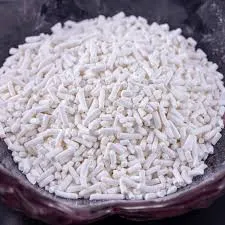
emulsifier baking
The Role of Emulsifiers in Baking
Baking is both an art and a science. While the basic ingredients like flour, water, sugar, and yeast are foundational, the use of emulsifiers can significantly enhance the quality and consistency of baked goods. Emulsifiers are substances that help blend two immiscible liquids, such as oil and water, creating a smoother, more stable mixture. In baking, they play several crucial roles, from improving texture to extending shelf life.
Understanding Emulsifiers
Emulsifiers are often derived from natural sources, such as lecithin from egg yolks and soybeans, or can be synthetic compounds. Common emulsifiers used in baking include mono- and diglycerides, polysorbates, and sorbitan esters. Each of these emulsifiers has unique properties and applications, making them suitable for different types of baked goods.
How Emulsifiers Work
When baking, the distribution of fat in batter or dough is critical. Emulsifiers help disperse fat molecules throughout the mixture, preventing them from clumping together. This even distribution ensures a uniform texture and prevents the formation of undesirable air pockets during baking. Additionally, emulsifiers help retain moisture in baked goods, leading to a fresher, softer crumb.
Another important function of emulsifiers in baking is their ability to stabilize the mixture. Many baked goods contain air to create a light and fluffy texture. Emulsifiers enhance the aeration process by stabilizing the air bubbles that form during mixing. This property is particularly vital in recipes like cakes and muffins, where volume and texture are paramount.
Benefits of Using Emulsifiers
1. Improved Texture and Volume The incorporation of emulsifiers can lead to greater volume and a softer crumb in cakes and breads. They allow for better air retention, resulting in baked goods that are light and fluffy.
emulsifier baking

2. Extended Shelf Life Emulsifiers help retain moisture during baking and storage. This moisture retention is essential for preventing staleness and ensuring that products remain fresh for longer periods, which is especially beneficial for commercial bakers.
3. Consistency in Results For bakeries that produce high volumes of goods, consistency is key. Emulsifiers help standardize recipes, leading to more predictable outcomes with each batch.
4. Enhanced Flavor Distribution Emulsifiers can improve the distribution of flavors within the product. By ensuring that fat-soluble and water-soluble ingredients mix smoothly, they contribute to a more uniform taste.
Common Applications
In home baking, while many people may not recognize the role of emulsifiers, they are often present in common ingredients. For instance, when using store-bought mayonnaise or certain margarines, you are already utilizing emulsifiers. In commercial baking, you’ll find them in items like breads, cakes, cookies, and pastry products, where they enhance the quality significantly.
Choosing the Right Emulsifier
When considering emulsifiers for baking, it’s essential to choose the right type based on the specific requirements of your recipe. Natural emulsifiers like lecithin are ideal for those seeking clean-label products, while synthetic options may provide more stability and control in industrial applications. It’s also possible to experiment by adding small amounts of emulsifiers to achieve desired characteristics in homemade recipes.
Conclusion
Emulsifiers are an indispensable component of baking that can significantly improve the quality, texture, and shelf life of baked goods. Understanding their roles and how they function can empower bakers to create better products, whether at home or in a commercial setting. By leveraging the benefits of emulsifiers, one can elevate their baking experience and produce consistently delightful treats. As baking continues to evolve, incorporating the right emulsifiers will remain a key factor in achieving culinary success.
-
Understanding Synthetic Rubber OptionsNewsApr.27,2025
-
Trichloroisocyanuric Acid: Essential for Clean and Safe WaterNewsApr.27,2025
-
Sodium Dichloroisocyanurate: Key to Safe Water TreatmentNewsApr.27,2025
-
Sodium Acid Pyrophosphate: Essential in Modern Food ProcessingNewsApr.27,2025
-
Essential Water Treatment ChemicalsNewsApr.27,2025
-
Denatured Alcohol and Its Industrial UsesNewsApr.27,2025
-
The Versatile Uses of Sodium BicarbonateNewsApr.24,2025
Hebei Tenger Chemical Technology Co., Ltd. focuses on the chemical industry and is committed to the export service of chemical raw materials.
-

view more DiethanolisopropanolamineIn the ever-growing field of chemical solutions, diethanolisopropanolamine (DEIPA) stands out as a versatile and important compound. Due to its unique chemical structure and properties, DEIPA is of interest to various industries including construction, personal care, and agriculture. -

view more TriisopropanolamineTriisopropanolamine (TIPA) alkanol amine substance, is a kind of alcohol amine compound with amino and alcohol hydroxyl, and because of its molecules contains both amino and hydroxyl. -

view more Tetramethyl Thiuram DisulfideTetramethyl thiuram disulfide, also known as TMTD, is a white to light-yellow powder with a distinct sulfur-like odor. It is soluble in organic solvents such as benzene, acetone, and ethyl acetate, making it highly versatile for use in different formulations. TMTD is known for its excellent vulcanization acceleration properties, which makes it a key ingredient in the production of rubber products. Additionally, it acts as an effective fungicide and bactericide, making it valuable in agricultural applications. Its high purity and stability ensure consistent performance, making it a preferred choice for manufacturers across various industries.











